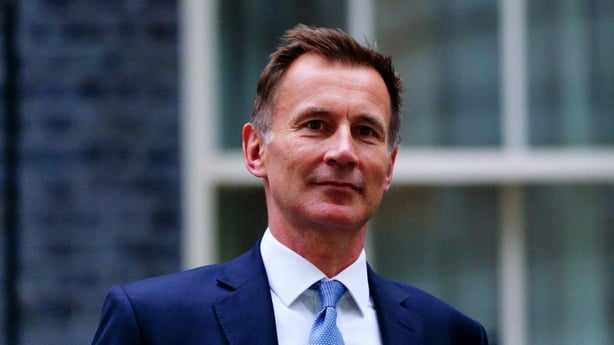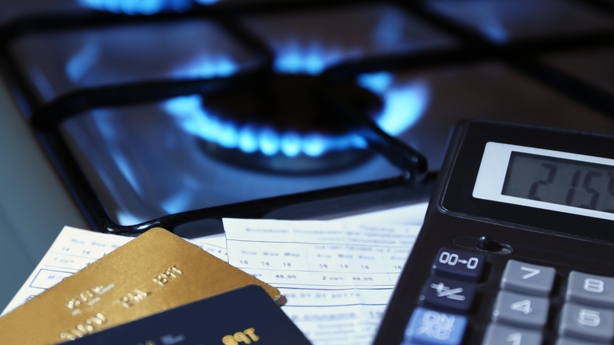It was widely referred to as the 'Boris bounce' as the most recent Conservative party leadership race entered its final phase.
The pound jumped in Asian trade on Sunday night into Monday as news came through that recent Downing Street departee Boris Johnson would not attempt a comeback - for now at least - essentially easing Rishi Sunak's path to number 10.
Sterling traded at close to US$1.14 and, against the euro, it went close to 86.5p - levels not seen for several dangerously uncomfortable weeks when UK government debt costs shot higher.
It was that same trading session that a few weeks ago heralded the start of the UK's recent bout of fiscal difficulties - and the premature end for Liz Truss's premiership.
Money markets gave a resounding thumbs down to her Chancellor's mini budget which crescendoed in the pound falling to close to parity with the US dollar in the early hours of Monday, September 26th.
But just as that session signified the low point for the pound (and a high point for UK borrowing costs), last Monday's move may have signified a relief rally and the start of what could be a very brief honeymoon period for new UK Prime Minister.
Stability
Currency traders and analysts appeared to be in broad agreement that Rishi Sunak's premiership would put a cap on the market volatility that's been witnessed in recent weeks.
"Sunak taking over... should restore a significant amount of credibility around UK policy, which is likely to limit downside for sterling assets in the near term," Michael Brown, head of Market Intelligence at Caxton said.
However, John Hardy, Head of FX Strategy at Saxo Bank, said although stability would likely be achieved, he didn't see any scope for a steady improvement in prospects.
"It's not like Rishi Sunak has a strong programme presenting greater horizons ahead for the UK economy when the backdrop is still the backdrop," he pointed out.
Bank of England deputy governor Dave Ramsden doubled down on that view. He said while credibility was in the process of being recovered, 'it has to be followed through'.
And therein lies the challenge for the new Prime Minister.
Steadying the ship is one thing, but now he and his Chancellor, Jermey Hunt, face the challenging task of balancing the books and convincing the markets that the UK is a reliable bet while at the same time attempting to stave off a recession that looks all but inevitable right now.

Daunting
"The new Prime Minister will face a daunting task," Conall MacCoille, chief economist with Davy concluded.
And the man himself was at pains to emphasise that point in his first speech on the steps of Downing Street, referring to the prospect of a 'profound economic crisis' ahead (although he insisted that he 'wasn't daunted'.)
Mr Sunak and Mr Hunt have pretty much had to hit the ground running. However, their medium-term fiscal plan and forecast from the Office for Budget Responsibility, which was to be published this Monday, has now been postponed until the middle of next month when it will take the form of a full 'Autumn statement'.
"Jeremy Hunt is now reported to be considering freezing income tax bands and thresholds over the medium term in an effort to rein in public borrowing," Mr MacCoille said.
And the pain will likely not end there.
Any economic contraction will put further downward pressure on the government's tax receipts in the months and possibly years ahead, meaning more unpalatable decisions will be necessary, including higher taxes and cuts in public spending.
Despite the plan's original date of publication coinciding with Hallowe'en, the sheer scale of the challenge is not as scary as it was a few weeks ago following the previous administration's mini budget when the markets took fright.
The numbers
Under former Chancellor Kwasi Kwarteng's plan, Britain would have had to knock £72 billion off spending or raise the same amount in taxes to get debt falling as a proportion of GDP by 2027, according to government forecasts seen by the Sunday Times.
About £30 billion of the £45 billion of unfunded tax cuts announced in the mini budget have already been reversed.
That leaves a narrower £40 billion hole.
However, given that the cost of borrowing over 10 years - having risen from 3.5% to 4.5% in the wake of the mini-budget - has now fallen back to around 3.5% again, the potential savings on interest payments should further narrow the gap to just £30 billion, a UK budget expert told Reuters.
The hope is that that gap might narrow even further in the weeks ahead as sovereign borrowing costs potentially fall further, but that's by no means a guarantee.
Either way, it's still a yawning gap. But the Prime Minister had more potential good news on his side this week.
The price of gas on the UK and Dutch markets fell to levels not seen since before the Russian invasion of Ukraine in February.

Household finances
That's potentially good news for a government that has capped average household energy bills at £2,500 until April of next year, thus limiting the Chancellery's exposure - for a while at least.
Given that the war in Ukraine shows no sign of ending, it's anyone's guess as to where energy prices will be next April.
The government has indicated that only the most vulnerable will be supported from April onwards.
So, UK householders potentially face a significant hike in their energy bills from next Spring, with some analysts estimating that the annual increase in prices could be of the order of £2,000 plus on top of the cap.
And that coincides with a significant hike in mortgage costs for many.
The costs of servicing a home loan hit their highest point in a decade and a half following the mini budget with the average 2-year fixed rate mortgage going above 6.5%. Banks are only now beginning to slowly unwind the so-called 'Truss premium.'
Many providers suspended products in the wake of the budget turmoil because they simply didn't know how to price them amid the market chaos that ensued.
And there's more pain to come for mortgage holders next week with another expected hike in interest rates when the Bank of England Monetary Policy Committee reconvenes.
Having slowly and steadily hiked rates by 0.25% at each meeting from the end of last year, the bank opted for a 0.5% interest rate rise at its latest meeting.
The jury is still out on how far the MPC might go next week.
"Markets are currently pricing in close to a 50/50 probability whether the Bank of England will opt for a 75bp (0.75%) or 100bp (1%) hike in interest rates at next week's policy meeting on November 3rd," Conall MacCoille said.
He pointed out that the bank was also expected to resume the process of shrinking its balance sheet by £80 billion over the next 12 months.
This, he said, would be 'a fresh test for the UK gilt (bond) market' which has experienced nothing short of a rollercoaster few weeks.
Not out of the woods
The UK economy is still in a fairly perilous position but the latest moves by Sunak, and indeed prior to that by the new Chancellor, Jeremy Hunt, (who was appointed by Liz Truss) has gone some way towards bringing it back onto something of a level playing field with the rest of the world as the global economy faces a steep contraction.
The UK is widely tipped to be one of the first major economies to tip into recession which the Bank of England has forecast will last for more than a year.
That will likely be accompanied by continued inflation and further interest rate hikes, heaping even more pressure on government and household borrowing costs.
Rishi Sunak may have been prescient in his warnings to Liz Truss that her debt-funded tax cuts would result in a spike in borrowing costs and a run on the pound, but far from basking in the credit for calming the storm, he's now in the driving seat and will take the credit - or the fall - for what happens next.
Once his markets honeymoon subsides, the Prime Minister may well struggle to keep both parliament and the UK people on his side.
His first nationwide electoral test is due in early 2025 but given the breakneck speed of developments in UK politics in recent years, that date with destiny may too be hastened.







